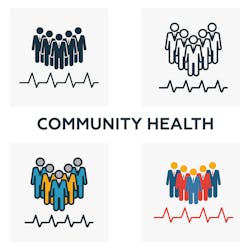During a recent roundtable discussion, community-based organization leaders shared their perspectives about how COVID-19 has intensified mental health and substance misuse issues, while offering strategies on how to strengthen community connections to develop a more comprehensive support network for those who are suffering.
The roundtable, convened by Pieces, a healthcare artificial intelligence (AI) company, included the following participants: Joe Powell, president and CEO of the Dallas-based Association of Persons Affected by Addiction (APAA); Stephen Williams, director, Houston Health Department (HHD); Jeremy Lampier, director at Pathways to Hope Reentry Program, based in Tarrant County, Texas; and Ruben Amarasingham, M.D., founder and CEO, Pieces.
The group referenced a recent a Kaiser Family Foundation poll which found that 53 percent of U.S. adults reported their mental health had been negatively impacted by the virus. Census Bureau data in December also showed that U.S. mental health problems have reached all-time highs, with almost half of Americans now showing signs of clinical anxiety or depression. And, substance misuse data is also alarming with federal statistics confirming long-standing worries that overdose deaths would rise sharply during the pandemic – and that more people are now dying of drug overdoses than at any other point in U.S. history.
As such, one of the key takeaways from the roundtable discussion was that the public must be properly educated about these illnesses to reduce the stigma and prompt much-needed societal change: "The public should know that they likely have family members or friends who have experienced addiction or mental illnesses – and may have suffered in silence," noted Powell. "They should also know that there are millions of people in long-term recovery from these challenges, and that recovery is possible for anyone."
Williams agreed, emphasizing the need to eliminate misconceptions. "People should understand that mental illness and substance use are diseases – and have a disease process akin to physical illnesses. This acknowledgement would help to eliminate the idea that persons with mental or substance use challenges should help themselves whereas individuals with physical illnesses warrant professional treatment and support," he said.
To that end, Lampier contends that this stigma can cause individuals to be hesitant to accept help. "Most people don't want to think they have mental health concerns. They're afraid of what they might lose once society labels them someone with mental health issues. For example, the right to own a gun, jobs, possibly their children if they seem as unfit, etc. They feel a lot of their freedoms will be lost when they are documented as someone with these issues. Nobody wants to be labeled."
Another key takeaway from the conversation was that partnerships and learning are key to both short-term change and longer-term systematic transformation: "We must learn how to build a recovery-oriented system of care that is culturally congruent to the population and community they are in," said Powell. "We must learn about the community, the stakeholders and all of the businesses that support health, wellness, and recovery."
Lampier added that there are different experts in each field for a reason. “Community organizations have to be willing to collaborate to meet just the basic needs of clients. Some organizations try to be a 'one-stop-shop' and when they do that, they spread their organization too thin and cannot give the best care to the clients," he said.
In Houston, Williams shared that the city has established collaborations and networks around substance misuse service delivery. "The HHD partners with its local mental health authority, mental health and recovery providers, and advocacy groups to increase help-seeking behaviors and reduce the stigma. Our partners work together around referrals and services, shared staff trainings and joint funding opportunities. We collaborate with public, private and non-profit sectors to increase the provision of services for individuals in need," he said.
A third core takeaway from the discussion was that embracing technology can help organizations to further their missions. According to Amarasingham, community organizations may not be aware of the full array of services available for clients in their areas because they don't have an easily accessible directory. He stressed that having a centralized platform to serve as a resource for referrals and managing clients can lead to more impactful, sustainable, and effective care.
Williams cited that technology has empowered the HHD to better communicate with those they serve to promote important health messages and reminders. "We also use technology to capture data on key performance indicators to demonstrate the effectiveness of our programming and measure metrics that matter to those they serve," he said.
Ultimately, "While our attention has been focused on COVID-19, we've had major public health problems raging in other critical areas in the background," said Amarasingham. "We must take these worsening trends as a call-to-action to refocus and double-down on our efforts to support these community organizations – and most importantly to connect these stakeholders to strategize, innovate and unite to combat this crisis together."
Amarasingham also believes that communities need more resources to support this important work. "I'm excited by new federal efforts to fund initiatives that address these critical issues. With better public policy, purpose-built technology, and more funding we can get a hold of this crisis and create a lasting impact for this generation and generations to come," he said.


